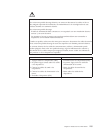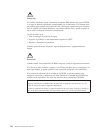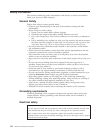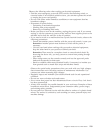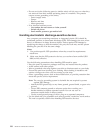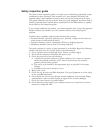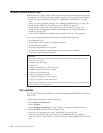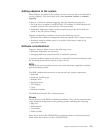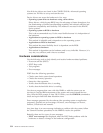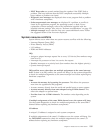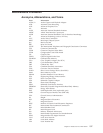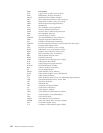Adding adapters to the system
When adapters are added to the system, an area in memory has to be allocated to
run its programs. This can be done with either hardware switches or software
mapping.
If there is a conflict in software mapping, then the following may be true.
v The first device to attach to an IRQ, DMA, I/O Address, or RAM location will
probably function. The second device will not be found.
v Standalone diagnostics might function properly because the device that was
found is the only device running.
Software configuration conflicts occur when the following are true.
v Hardware has a different configuration than the software that is using it expects.
v Hardware memory address space is in conflict with memory used by the
application software.
Software considerations
Suspect a software failure if one of the following is true.
v Hardware diagnostics run error-free.
v Swapping hardware components fails to isolate the problem.
A software problem might be the result of a mismatch between the hardware and
the operating system device drivers or direct drivers.
BIOS
The BIOS acts as an interface between the system hardware, application software,
and the operating system.
The BIOS contains the instructions to operate the basic system components:
v Keyboard
v Serial and parallel ports
v Diskette drive
v Hard disk drive
v VGA display
v Clock
v Memory controller.
The BIOS then starts the IPL or Boot functions.
Drivers
Device drivers are the BIOS for additional hardware. They are the communicators
of the hardware assignments to the operating system, including the following:
v IRQ level
v DMA channel
v I/O address
v ROM or RAM.
Some device drivers like HIMEM.SYS are position sensitive and must be placed
before other device drivers in the CONFIG.SYS file.
Chapter 9. Related Service Information 133



